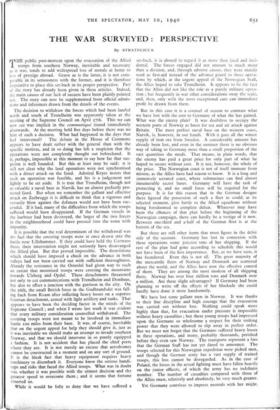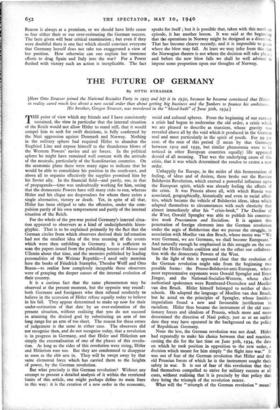THE WAR SURVEYED: PERSPECTIVE
By STRATEGICUS
THE public post-mortem upon the evacuation of the Allied troops from southern Norway, inevitable and necessary as it was, tends to add widespread loss of morale at home to loss of prestige abroad. Grave as is the latter, it is not com- parable in its seriousness with the former, and it is therefore imperative to place this set-back in its proper perspective. Part of the story has already been given in these articles. Indeed, the main causes of our lack of success have been plainly pointed out. The story can now be supplemented from official admis- sions and inferences drawn from the details of the events.
The decision to withdraw the forces which had been landed north and south of Trondheim was apparently taken at the meeting of the Supreme Council on April 27th. This we can now see was implicit in the communiqué issued immediately afterwards. At the meeting held five days before there was no hint of such a decision. What had happened in the days that had intervened? The debate in the House of Commons appears to have dealt rather with the general than with the specific motives, and in so doing has left a suspicion that the operations were not completely thought out beforehand. It is, perhaps, impossible at this moment to say how far that sus- picion is well founded. But this at least may be said: it is still not clear why the land operations were not synchronised with a direct attack on the fjord. Admiral Keyes insists that such an operation was feasible, and his is a judgement not lightly to be set aside. It is true that Trondheim, though not as valuable a naval base as Narvik, has an almost perfectly pro- tected fjord. But when we remember the gallant and effective attack on Zeebrugge it is difficult to think that a vigorous and versatile blow against the defences would not have been suc- cessful. If it had, many of the difficulties from which the troops suffered would have disappeared. If the German vessels in the harbour had been destroyed, the larger of the two forces in the neighbourhood could have pressed into the town with impunity.
It is possible that the real determinant of the withdrawal was the fact that the covering troops were at once drawn into the battle near Lillehammer. If they could have held the Germans there, their intervention might not seriously have disarranged the Allied plan. But that proved impossible. The demolitions which should have imposed a check on the advance in both valleys had not been carried out with sufficient thoroughness. Already the resistance in the Osterdal had given way to such an extent that motorised troops were crossing the mountains towards Ulsberg and Opdal. These detachments threatened not only to cut communications with Trondheim and Dombaas, but also to effect a junction with the garrison in the city. On the 26th, the small British force in the Gudbrandsdal was fall- ing back from Kvam after inflicting heavy losses on a superior German detachment, armed with light artillery and tanks. That appears to have been the deciding factor in the minds of the Supreme Council ; and when I wrote last week it was evident that every military consideration counselled withdrawal. The covering troops were not meant to be involved in immediate battle ioo miles from their base. It was, of course, inevitable that on the urgent appeal for help they should give it, just as it was inevitable we should make an attempt to invade southern Norway, and that we should intervene in so poorly equipped a fashion. It is not accident that has placed the chief ports where they are. It is not merely an excuse that aerodromes cannot be constructed in a moment and on any sort of ground. It is the bleak fact that heavy equipment requires heavy machinery to disembark it. Everyone knew the serious handi- caps and risks that faced the Allied troops. What was in doubt was whether it was possible with the utmost decision and the greatest speed to overcome them ; and it seems that fortune deserted us.
While it would be folly to deny that we have suffered a set-back, it is absurd to regard it as more than local and inci- dental. The forces engaged did not amount to much more than a division, and, through adverse causes, they were mainly used as first-aid instead of the advance guard to those opera- tions by which, at the urgent appeal of the Norwegian Staff, the Allies hoped to take Trondheim. It appears to be the fact that the Allies did not like the role as a purely military opera- tion; but frequently in war other considerations sway the scale, and, then, only with the most exceptional care can immediate profit be drawn from them.
But in this case it is a counsel of reason to contrast what we have lost with the cost to Germany of what she has gained. What was the enemy plan? It was doubtless to occupy the western ports of Norway as bases for sea and air attack against Britain. The most perfect naval base on the western coast, Narvik, is, however, in our hand§. With it goes all the winter supply of iron ore from Sweden. A considerable amount has already been lost, and even in the summer there is no obvious way of taking to Germany more than a small proportion of the vast quantities she needs. That means, in plain words, that the enemy has paid a great price for only part of what he hoped to secure without cost. It is not, however, the whole of the price. The Norwegian coast is not of itself immune from misuse, as the Allies have had reason to know. It is a long and immensely serrated coast, where submarines can find almost innumerable secret bases. Germany will have the task of protecting it, and no small force will be required for the purpose. It is for this reason that in the German designs there figured the possession of such a fleet as could, at its selected moment, give battle to the Allied squadrons without being foredoomed to complete defeat. Whatever may have been the chances of that plan before the beginning of the Norwegian campaign, there can hardly be a vestige of it now. Between one-third and a-half of the German fleet is at the bottom of the sea.
But there are still other items that must figure in the debit side of the .account. Germany has lost in connexion with these operations some 300,000 tons of her shipping. If the rest of the plan had gone according to schedule this would not have been of the first importance. But, as we have seen, it has foundered. Even this is not all. The great majority of the mercantile fleets of Norway and Denmark are scattered about the world, and the Allies have now the effective control of them. They are among the most modern of all shipping fleets. Norway has over four million tons and Denmark over a million. Are these slight advantages? If Germany had been planning to write off the effects of her blockade she could hardly have done it more handsomely.
We have lost some gallant men in Norway. It was thanks to their fine discipline and high courage that the evacuation was carried out without loss. Nothing could speak more highly than that, for evacuation under pressure is impossible without heavy casualties ; but these young troops had impressed upon the Germans so wholesome a respect for their striking power that they were allowed to slip away in perfect order. But we must not forget that the Germans suffered heavy losses in these operations, and many, probably thousands, perished before they even saw Norway. The transports represent a loss that the German Staff has not yet dared to announce. The troops selected for this Norwegian expedition were picked men, and though the German army has a vast supply of trained troops, this loss cannot be disregarded. As in the case of Poland, the losses in the actual fighting must have fallen heavily on the junior officers, of which the army has no indefinite number. The number of casualties compared with those of the Allies must, relatively and absolutely, be very much greater.
Yet Germany contrives to impress neutrals with her might. Reason is always at a premium, or we should have little cause to fear either their or our over-estimating the German success. The facts given will bear critical examination ; but even if they were doubtful there is one fact which should convince everyone that Germany herself does not take too exaggerated a view of her position. How otherwise can one explain her immense efforts to drag Spain and Italy into the war? For a Power flushed with victory such an action is inexplicable. The fact speaks for itself ; but it is possible that, taken with this nord rn episode, it has another lesson. It was said at the begini ag that the operations in Norway might be designed as a divers n. That has become clearer recently, and it is impossible to g -ss where the blow may fall. At least we -may infer from this the Norwegian theatre is not where the decision will take pla_e; and before the new blow falls we shall be well advised to impose some proportion upon our thoughts of Norway.































 Previous page
Previous page